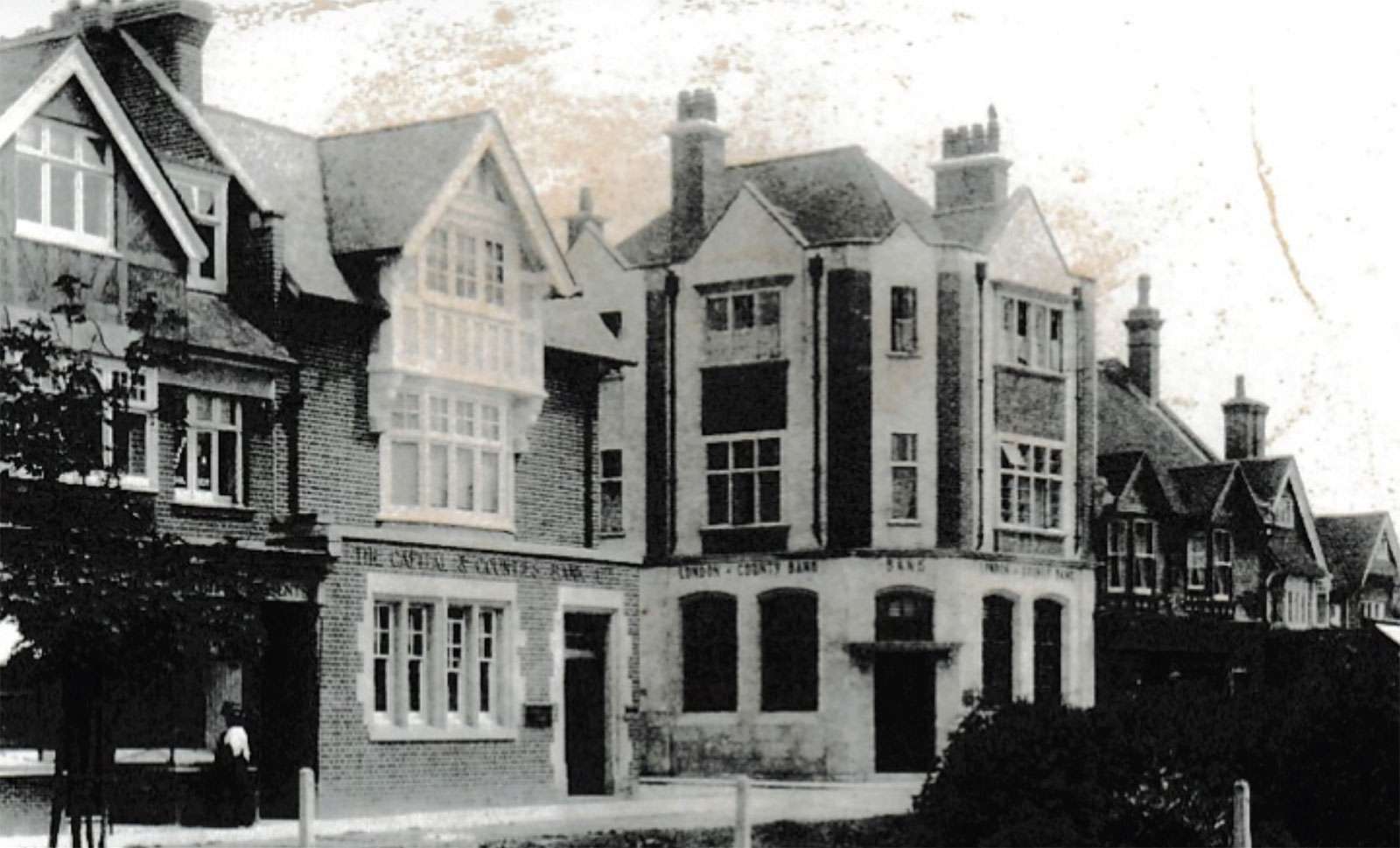
(Above: Cranleigh’s two banks facing each other across Rowland Road. George Selfe was cashier at one or other of these.)
Several Cranleigh people, very varied in type, appeared before the Hambledon Appeals Tribunal in Guildford this month, hoping to be exempted from compulsory military service. George Wilson Selfe, 31, bank cashier, declared that his private doctor said that he was not fit to lift heavy things, ‘and if he joined the Army, he would eventually be in hospital’. The tribunal was unmoved, and dismissed his appeal.
An unnamed assistant master from Cranleigh School, aged 41, described the school’s difficulties as eight younger masters had already left to join the army: the tribunal responded that if it was correct that he was 41, he could not be called up anyway. An unnamed Cranleigh applicant said that he was manager of his father’s drapery and clothing business: his father was 70 and unable to do any work. He was granted two months’ exemption, though the chairman said ‘the case showed rather extra hardship’. More farmers appeared, desperate to retain some of their skilled workers. James Manfield, who lived at ‘Thorn’s Flush’ on the Guildford Road and farmed Hollyhock Farm, Cran- leigh, asked for the exemption of his son, Arthur James Manfield, general farm and stock worker. The farm consisted of 20 acres and ‘he also owned a brickyard’
(now Manfield Park industrial estate). He was already reduced to only two men to work both concerns. He was refused. A.B. Johnston of New Park Farm asked for the exemption of Thomas Ugle, 25, agricultural engineer, but was also refused.
At the Northampton Boot Stores, the proprietor, Charles Crick, had also lost his assistant, Charlie Croxford, who had been called up in January 1916, so all the repairing work now fell to him. However, he was seeing his takings increase steadily during the war. In his first year in Cranleigh, 1910-11, the total was £482, by 1913-14 this had increased modestly to £575, but by 1916-17 it was £980. Evidently, Cranleigh people could not resist the fashionable shoes displayed in his shop window (where Oxfam now is).
Meanwhile, Charles Crick’s son Rennie, who had survived the Dardanelles disaster, had been moved with his RAMC unit to Egypt, where the Ottoman Turks were threatening the Suez Canal. In March 1916, his Ambulance unit moved by night to the Sinai Desert, about
250 yards beyond the Suez Canal. The new camp which they set up at El Ferdan was eight miles from the trenches on the Front Line with the Turks. In his diary, he describes the heat as ‘terrific’, so that no parades were held after 9am, and within a couple of days a sandstorm developed that they thought would blow away their tent. Rennie had to help carry a wounded soldier from just behind the Front to a Casualty Clearing Station two miles from their camp, and ‘it was awfully hot’. The next day he records without comment, ‘an Infantryman shot himself just outside our camp in the early morning’. One day, he notes, ‘I was on guard all day, so have nothing particular to note, except I saw the Prince of Wales go up to the trenches in a motor’. Other days, the men were kept busy filling large numbers of sandbags – tedious work, but much needed in the trenches on the Western Front.
There were some compensations. Rennie learned to swim in the Suez Canal, and tried his hand at fishing there, without any success. A gramophone was given to his Ambulance unit, and they played it in the recreation room at night. No need for electricity: the gramophone was wound up by hand before each record. Maybe the soldiers sang along with the hit song of 1915:
Pack up your troubles in your old kit bag And smile, smile, smile!
While you’ve a Lucifer to light your fag Just smile boys, that’s the style!
What’s the use of worrying, it never was worthwhile, So pack up your troubles in your old kit bag
And smile, smile, smile!






